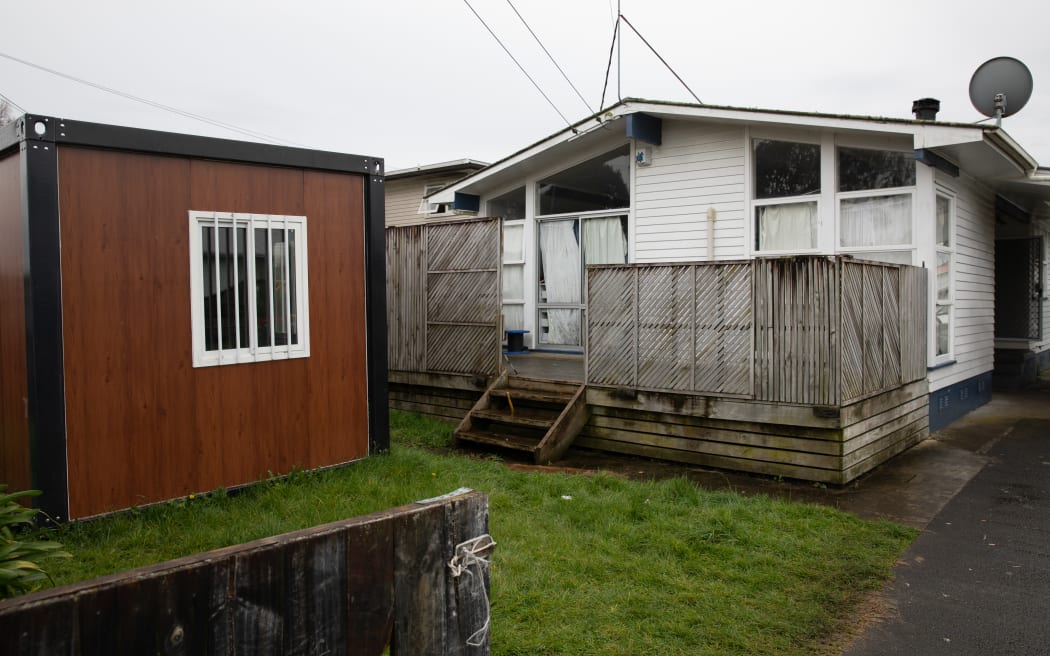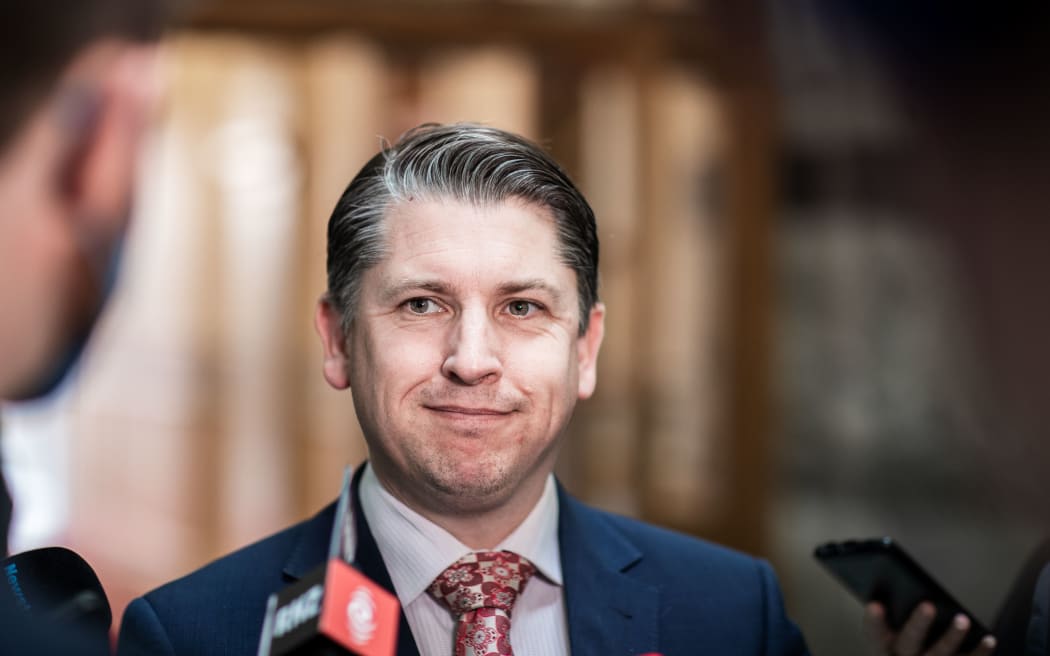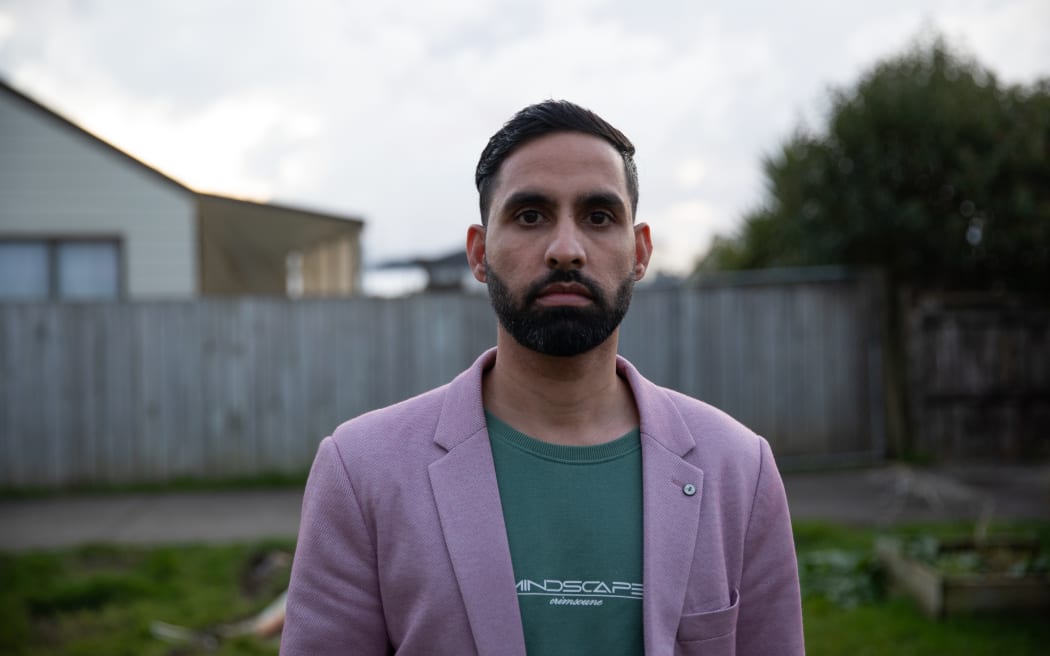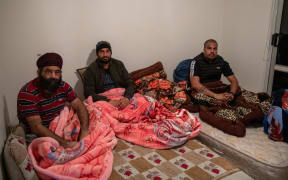
Immigration broker Ravi Reddy has been linked to a three-bedroom house in Papakura that was part of an Immigration New Zealand investigation into allegations of exploitation. Photo: RNZ / Blessen Tom
It was a scheme Ross Berry hoped would make millions. Instead, 40 hungry men wound up crammed in a house, and his business is in ruins. Steve Kilgallon investigates.
"We cannot afford to not feed the people. When we don't feed the people, they go to the f...ing press."
Ross Berry was angry and anxious. Newshub was about to run a story about 40 unpaid Indian migrant workers crammed into sub-standard accommodation in south Auckland. And some of those men carried visas with his company's name on them.
On the other end of the phone call was Ravi Reddy, the broker who helped arrange the men's arrival in New Zealand - and, they alleged, charged them illegal premiums of up to $30,000.
Reddy was calm, and began trying to run Berry through talking points for the media. "The news will come, Ross, you need to understand that … before anything comes out very nasty about us, you need to mention these points." He should, said Reddy, blame a slowing job market, the migrants themselves for having poor language skills, "and we need to blame something on the Government as well".
Berry asked Reddy: "Why am I in the gun for your f...ing shit?"
It was the last time Berry spoke to Reddy. Since then, he's lost his business, marriage, car, home and health and worried he would be the scapegoat for a badly-broken immigration model.
So broken, that Berry's company, CPL Jobs, was actually deeply in debt to the IRD when he was granted 840 job "tokens" by Immigration New Zealand.
A token entitles an employer to bring a migrant worker into the country and there was serious money to be made from them - illegally, if you were willing to breach Immigration rules and 'sell' jobs for premiums offshore to desperate Chinese, Indian and Nepali migrants, or legally, because labour hire companies could bring in migrants on a $27.66 an hour wage, and effectively rent them out to companies at $42 an hour.
Berry was sitting on a gold mine worth up to $33m.
And so the sharks began to circle.
Changing people's lives
Berry came to New Zealand from his native Scotland as a printer, but eventually wound up in labour hire, with his business, CPL Jobs (the CPL stood for Changing People's Lives), placing Kiwi casual workers in labouring, asbestos removal and demolition jobs. Admission here: about 15 years ago, we played on the same social football team, although I hadn't seen him for well over a decade until being reintroduced for this story.
Berry's first foray overseas was to bring in South African crane operators for KiwiRail, and in 2018, he attempted to land some Filipino bricklayers. The scheme didn't work, but crucially, he gained accreditation with the Filipino overseas labour office (POLO). He was quick to see potential in New Zealand's Accredited Employer Work Visa (AEWV) scheme, announced in 2022, which made it relatively easy to bring in large groups of migrant workers. Berry had run up a substantial Inland Revenue Department (IRD) debt, and thought this new visa could be his salvation.
He had contacts with employers whom he knew would be keen to recruit the migrants, but not deep pockets (he admits being "leveraged to f..."). So he struck a deal with Scott Mathieson, who owned recruitment company Working In, based in a Ponsonby office within spitting distance of his own. Mathieson, who has 25 licensed immigration advisers on staff and a track record dealing with big employers, says he agreed to the deal because Berry already owed him $170,000 from a previous arrangement to supply workers, and this seemed the only way to pay it off (Berry vehemently denies this).
Berry admits he played a significant part in his own downfall and wishes now he'd stuck safe in the domestic market. "I was running a life," he says. "I didn't care about money, I'm being honest. I didn't need to, because money was flowing. I should have been putting it away ... but I wasn't. They all sat at my table and let me pay the bills and watched it happen. They all went to the races on my tab."
The deal was Mathieson would source Filipino tradies (and settle them), and Berry would source the work (and pay them). The maths were good. Employers paid a $5,000 upfront fee, then $42 an hour for each worker. The worker got $27.76, and once Berry and Mathieson had taken care of ACC, insurance and back-office costs, there was ten dollars left over - $2 for Mathieson and $8 for Berry. If you net that gross profit out, then 800 tokens could mean $33.176m a year. But labour hire companies walk a tightrope - if there's no work, a worker is dismissed, or a client pays late, they're on the hook for those wages.
CPL's accreditation was confirmed in August 2023, and by September, Berry had told the haulage industry he had 60 drivers coming. The following month, his deal with Mathieson was signed off. "It just blew up, everyone came forward. It was impossible to keep up with." At this stage, says Berry, "I'm fearless".
CPL fielded orders for 100 drivers, but only had tokens for 60. Berry asked Immigration New Zealand (INZ) for more, then for tokens for other industries, such as scaffolding and electrical, and ended up with 840. Other labour hire companies were doing the same. "It was a race."
Mathieson made a payment on Berry's behalf to stave off an increasingly aggressive IRD, while the deals kept coming.
But, felt Berry, IRD was moving faster than INZ. He recalls a conversation with one senior IRD official in which he burst into tears. Berry had conversations with the then-immigration minister, Michael Wood, and thinks the Government didn't want one of their biggest token holders to fail. Wood says he approached IRD to ask them to "manage his case in a reasonable way", but did that in his capacity as (he mistakenly thought) Berry's electorate MP, a situation he said "wasn't uncommon" for MPs.

Former Immigration Minister Michael Wood says he asked IRD to take a "sympathetic" look at Ross Berry's debts. Photo: RNZ / Samuel Rillstone
On 29 January, 2023, they landed their first migrant. Berry met electrical assistant Meynard Alvarez off the plane, took him up Mt Eden, bought him fish and chips, and dropped him at his accommodation. Then, that night, back in Scotland, Berry's father died.
Berry and Mathieson were still close enough mates that they had a drink together before Berry flew home for the funeral. While in Scotland, he tore knee ligaments, leaving him wheelchair-bound and delaying his return. That's when the wheels came off.
There was a bottleneck - they had visas approved, flights paid for, and workers landing, but no pay packets coming in. Berry suspects Mathieson had bled about $1.2m by this stage. During the funeral, Mathieson texted Berry to say he couldn't keep buying flights without payment. It was costing him, he reckoned, $5,000 a man to bring them in, "so to land 100 is $1/2m and that's impossible". The text ended: "We can either transfer clients from CPL over or liquidate. That's where we've got to."
According to Berry, Mathieson then stopped telling his staff the details of the new arrivals, and began approaching customers directly, and securing variation of condition (VOC) approvals from INZ to switch the workers over to his company. "He eventually got every one of their visas changed," Berry claims.
An employer who agreed to take staff from CPL said: "Scott came to see me and said Ross was in the shit, he was going bust, and he was taking over all the workers." He got the staff he wanted, but paid Working In instead of CPL.
Mathieson terminated the arrangement via lawyer's letter on 13 February, saying CPL owed about $104,000. Berry's lawyer responded saying they had invoices suggesting over 100 workers had been recruited, yet CPL hadn't been told of that many. CPL offered a $60,000 settlement if Working In didn't pursue liquidation.
Four of those original Filipino workers talked to Stuff on condition of anonymity. Three of the four had received VOCs, one of them before he'd even departed the Phillipines. "At first, we were expecting CPL, then they told us CPL had gone bankrupt and they said Working In would pay for our variation," said one scaffolder, who arrived in the middle of 2023.
Another declined to vary his visa. "I told them I want to go to CPL. But they told me they would cancel my visa or send me back to the Phillipines."
Asked how many had their visas varied, one said: "It's electricians, scaffolders, truck drivers, bus drivers … and I think Boss Ross doesn't know about them. They just keep arriving ... and some of them don't have work."
Berry provided statements from another three workers essentially saying the same thing.
Mathieson disputes almost all of this. He says going into business with Berry was his "worst mistake" and wishes they'd never met.
To him, it's simple: they had a deal that Berry almost instantly reneged on. Berry says the understanding was the $5,000 employer fees were for his cashflow and Mathieson would take his cut once wages began flowing. But Mathieson produces a document which says they were to go into a shared account and split, because it was costing him up to $6,500 to land each migrant.
Mathieson says he cut ties after Berry failed to bank 61 deposits. Berry, he says, owes him $300,000. "I really did want to help Ross and we financially assisted him and I really worked hard to make it work.". But, he says, he felt he couldn't trust Berry, and that Berry didn't pay when promised.
Mathieson says he's enjoyed an excellent reputation in the industry and doesn't want it tarnished.
He agrees he changed the visas and visited the employers, but describes a "moral obligation" to intervene and prevent more migrants arriving to an unstable situation. He believed workers were going unpaid, and if Berry went under, those visas would become invalid. He admits telling people of a winding-up notice served on CPL by the IRD on 3 April, 2023. Most employers were "grateful we came up with a solution", he says.
But he denies telling workers they would be deported. "The message would have been, 'We can offer you a job - as soon as this company goes into liquidation, your visa is no longer valid'."
Mathieson is dismissive of Berry's father's death as a factor, saying it had no impact on what transpired: "Ross has fallen on his own sword."
He says the workers who back Berry are a minority, whom he thinks are in thrall to a man who exerted "immense influence". He says even Berry's nickname - "Boss Ross" - shows an unhealthy relationship. Nassim Lahlezari, Mathieson's chief commercial officer, even ventures the words "Stockholm Syndrome".
Berry, says a source familiar with the situation, became obsessed with Mathieson.
There was an altercation in the street by their offices, for which both blame the other, and Mathieson says was "handbags, not even that". There was also a strange dispute outside a rental property in Papatoetoe, where Mathieson called police, concerned some workers were being held against their will by people associated with Berry, and Berry retorted by organising a trespass notice.
Eventually, the lawyers' letters fizzled out. Mathieson says he's gone back to solely working with big corporate clients: "I made a decision in March last year to put this in my rear-view mirror."
The mysterious Ravi Reddy
Berry was desperate. The dispute with Mathieson stripped him of any income. IRD was still in pursuit. But there were still at least 600 tokens left.
Along came Ravi Reddy. Reddy was introduced to Berry by Ramesh Koney, a businessman once ordered to personally pay penalties after an Employment Relations Authority decision against a former company of his for using unpaid volunteer labour.
At Koney's West Harbour home, Berry and Reddy signed an agreement.
Reddy would pay IRD $200,000 immediately to get them off Berry's back, then give Berry $15,000 a week to gain access to the tokens (Berry says he got about $170,000 from the deal, but used it to pay seven staff and office costs).
Just as with Mathieson, Berry would find job placements, and Reddy would recruit them and provide "initial accommodation".
Koney is eager to distance himself (Berry says he attended multiple meetings). "Ross was looking for big money as an investment, I said 'I can't do', so I introduced him, that's all," he says. "They were both insisting me to invest and I said, 'No'. I haven't seen Ross Berry placing anyone, I don't think he was a genuine recruiter at all."
While Reddy did the deal, the contract was on behalf of Target Jobs, whose sole director and shareholder was a Noel Leeming computer technician named Umesh Patel.
Patel says he met Reddy when he was running a now-defunct language school for which Reddy recruited some students. He was, he claims, "for name's sake" the director, but Reddy handled "all the candidate and employer part". He'd established the company because Reddy was serving a 10-month home detention sentence imposed in March 2022 after two separate prosecutions brought by INZ for supplying false and misleading information to an immigration officer. Patel says Reddy "wanted to get out of the house, so he asked me to open a company and offer me a letter [job offer] so I (Reddy] can come out".
Reddy also visited Mathieson attempting to settle Berry's debts with Working In. Mathieson claims Reddy's "jaw dropped" when he learned the true figure, and Reddy was escorted out of the office.
Berry admits visiting clients to offer workers without really knowing who was coming and how many tokens were being used. He says he suspects now that agents in India and Dubai were selling the jobs. "He's [Reddy] basically bought the tokens with his $15,000," he admits.
The arrangement quickly failed. Berry says he realised Reddy was keeping him in the dark when he agreed to give a talk to the new arrivals at one of his favourite haunts, the Grey Lynn RSA, about assimilating into New Zealand.
His first shock was how many turned up - he'd expected 10, but 30 arrived. His second was how little English most of them spoke. He knew finding them work would be difficult. "I thought 'Holy f..., what's going on here Ravi?'," he recalls. "I can't give them to my customers, they can't accept these guys."
He found driving work for four of them, and after four days, their employer rejected them citing a lack of language skills. Most were left without income in accommodation provided by Reddy. Umesh Patel claims Reddy fed and housed the men for at least three months before "everything fell apart". He'd since met one of the candidates, who said he'd paid about $16,000 in India for his visa. "Ravi put everything on Ross," he says, "[but] I think both of them [are at fault]." He blames Reddy for bringing in too many men, and Berry for not finding them work.
When INZ investigators interviewed Berry, they had obtained many of his messages to Reddy and other associates. In one he says: "I believe someone has landed [without my knowledge], this is not to happen again … I need to know when people land. This is causing me deep concern and stress and anxiety." Asked by an INZ investigator for the context of the message, Berry said: "I was going off my tits at them."
Then, on 14 August last year, Newshub's Nick Truebridge reported 40 men, who were crammed into a three-bedroom Papakura house, claimed they'd paid up to $20,000 each for jobs. Within two days, Truebridge had found four more houses under INZ investigation. Union organiser Mandeep Bela said there were 60 drivers waiting for work from CPL. Newshub also obtained a video message Berry sent to the men apologising, saying it had taken too long to find them jobs. The men had visas from six different companies, not just CPL, Bela says, "but Ravi was the common link between them all".

Union organiser Mandeep Bela Photo: RNZ / Blessen Tom
Berry was in Sydney when he heard the story was coming. He says he collapsed, breaking his hand in the fall. "Not until the s... hit the fan and these stories start coming out do I learn they've paid $27,000 each. That never got to me. I don't have the f...ing money, I'm on WINZ. I couldn't get any answers." Berry is adamant he never knew of the job premiums until it was too late.
That's when Reddy gave Berry his impromptu media training. The men never spoke again. Umesh Patel, who says he was owed about $10,000 by Reddy, couldn't locate him either, bar a brief phone call after the first story, in which Reddy blamed Berry for not finding the men jobs. Patel by then had transferred ownership of Target Jobs to a man called Jeff Michael Shayne, whom he says was an Australian friend of Reddy's who was here for just three days to take over the company.
Even former minister Wood tried to find Reddy, describing him as a "scumbag". Stuff has also failed to contact Reddy. INZ confirmed he's no longer in New Zealand.
For the Papakura migrants, says Bela, there were surprisingly good outcomes. Stung into action, the Government offered migrant protection visas, a month of hotel accommodation, and jobs roadshows. Scott Mathieson says that at Wood's personal request, he found work for some (Wood confirms this).
After the Reddy deal crumbled, Berry was again without income. His marriage failed ("through my own doing," he stresses), he lost his home, and lived out of his car, jammed with documents and files. Then his car was stolen. He was assaulted, suffering a double cheekbone fracture. He was evicted from transitional housing. He's on a WINZ benefit of just $277 a week and his mental health is fragile.
Having failed to prevent the liquidation of CPL (between his two companies, CPL and Long White Cloud Consulting, there were debts of about $2.1m), he's resisting personal bankruptcy, seeking revenge on Mathieson and Reddy, and fighting smaller battles, such as a dispute with his insurer, which has refused to pay out his income protection policy.
Through a mutual friend, he found immigration advisor Tuariki Delamere, who agreed to help, pro bono. In January, Berry gave a three-hour interview to INZ investigator Andy Iese, with Delamere accompanying him as his advisor.
The former immigration minister left that meeting convinced Berry hadn't himself committed any criminal offences, but through "ignorance and naivete" provided a platform for several others to commit major breaches of the Immigration Act.
INZ refused to give Stuff an interview. Instead, in a statement, their head of investigations Steve Watson said such inquiries are "complex and time-consuming… [and] can take months to fully investigate … and achieve an ideal conclusion". Watson wouldn't comment on open investigations.
One man linked to the affair - none of those named in this story - has been charged by INZ, but has name suppression.
After INZ interviewed Berry for a second time, they reached the same conclusion as Delamere, with senior investigator Brett Roberts asking Berry for a witness statement, and saying: "We are satisfied that unless further information comes to light, you will not be charged with an offence".
Berry claims he's told INZ - and Stuff - the unvarnished truth. He's sorry, and hopes he's at the start of the long road back.
Businessman Stefan Rausch, who has acted as Berry's mentor, says Berry is "at the bottom, as far as you can go" but says "he has 'fessed up ... he's made some bad business decisions that have got him into this place he's at". "Were they intentional? No, he's not that bad, otherwise I would've walked away a long time ago."
This article was originally published by Stuff.



